Indian
South Delhi, India
Auckland, New Zealand on 13 November 2001
Sydney on 13 November 2001
One of my husband’s friends used to live in Kogarah [in Sydney's southern suburbs]. Luckily he was going overseas for one month and offered us his house. We were very fortunate because our container took one month to arrive.
Adecco human resource management as consultant.
Actor, playwright, producer and workshop facilitator with own not-for-profit organisation, Abhinay School of Performing Arts in the Hurstville area.
I was born and brought up in South Delhi in India and had fun. I have two brothers. My life was fine as a child. I still have a lot of memories. I try going back every year. I have my roots there: my parents, the place where I grew up. I am attached to that area.
I have always seen my parents being very busy workaholics all of their lives. [They] are both pharmacists. My mother is no more; we lost her three years ago. I feel sad about it. My mother was very active until the very end before she died.
My mother always encouraged me to keep busy. I think that is how it started. I was actively involved in school – singing, dancing, workshops – and in National Cadet Corps, as we call it ‘NCC’. It was a fun, full-time holiday program in school and uni[versity]. I used to paint, I learnt cooking, mountaineering. I learnt how to do embroidery, crochet, stitching, sewing. Things that my mother thought were important.
We learned signals, first aid, home nursing and also firing. I received many awards. I received first award in shot put competition. Also in cultural activities, I got the best actress award, I remember. Each one of them brings back memories of the fun camps, the fun friends and the activities we used to do. It was a very active life as a child. This is a prestigious trophy for the best camp commandant. They see your management skills and leadership qualities.
My dad encouraged me to collect stamps and coins which was his hobby he passed on. I think he started when tourists to his pharmacy would give foreign currency. He used to give me [them] as a child. That’s a way of educating us of a new country with the currency. Whenever I go back he still gives me some coins, especially Indian coins which are not in circulation now. I add them to my collection. My son has taken over that hobby from me. We have quite a big collection now.
That was a crochet bedcover my maternal grandmother was making for me [for] more than a year. She was old and retired and had a lot of time. She would do it at a good speed every afternoon and was very good at it. I remember seeing her do that. We used to visit her very regularly. She was very close to all of her grandchildren. She lost her husband, my grandfather, when she was very young. She was raising four children on her own. We were really very attached to [her]. She wanted to leave behind something for us. It is very precious to me.
My mother was a very busy lady. She didn’t have that much time. [During] school holidays we would compete crocheting with each other. She could only do one tablecloth and she gave up as she didn’t have much time.
I [studied] tourism, travel and business management [and] worked for Sheraton Hotel. I was discouraged to work in films [by] my family. They thought it was not a very good profession. They wanted me to get married and settle down, have children and lead a normal life. I was made to refuse every time I was offered a good role. It is very middle-class thinking. I am a very obedient daughter and sister so I just gave in.
I also worked for an airline but ended up in an advertising agency. I started my own agency and went into events and public relations. It was very full-on. In the evenings I did theatre. The theatre was not a taboo. Mostly I was playing an old woman because I was the eldest in the group! Besides acting I also did play adaptations and acting workshops. I also did modelling assignments and television and radio programs [whilst] living in Delhi and working simultaneously in advertising.
My husband and I decided to move to New Zealand in 2001. We lived there for one year and then my husband and three kids, we all moved to Australia. As you know I have always led a very busy life. When we were in Auckland I did have some work but because of the size of the country and the population, I thought Australia – a bigger country with a lot of people and a lot of movement – was the place for me. We came for a holiday and we really enjoyed. We thought Sydney was so much more happening than Auckland! The Mardi Gras was happening and we were living [nearby] in Oxford Street. There was a lot of activity and we thought life was real fun.
When we decided to move, we didn’t want to leave our things behind. I am a very emotional person. I am attached to so many things. I have a small art and craft thing which I made when I was 13 or 14 years old. I am surprised I have it; I had forgotten all about it! This is a sindoor box my father gifted it to my mother. This is almost 50 years old and I think probably the first gift he gave her.
These are pins which my mother used to use every evening in her jura. She used to make her jura every evening. It is like a bun and she would just put [the pins in] after making a bun. It was very much in fashion then. When I miss my mother, I actually make a bun and use these pins.
This one in the red packet is a very strange thing. This umbilical cord the nurse gave to me when I delivered my son, Shourya, in India. I just kept it in this red piece of cloth and it has been there since. I haven’t opened it; I don’t know what shape it is in right now. But I just have it. I still don’t believe I did that. It is a very special moment for me.
This is a silver spoon and silver glass I used to feed my child. And this is a [baby] bracelet somebody gifted him. It is made of silver, white and black beads. This is a sheet I made for Shourya which I use quite a bit. I did this embroidery when I was pregnant. The other one is a kurta and my mother did that embroidery for my son. She copied the design from another kurta my brother used to wear as a child.
We decided to move to Sydney. One of my husband’s friends used to live in Kogarah [in the southern suburbs]. Luckily he was going overseas for one month and offered us his house. We were very fortunate because our container took one month to arrive. [Until] then we had a fully furnished house to live in. We started liking the St George area and settled down here for the last 11 years. We have moved from Kogarah to Carlton to Blakehurst [to] Penshurst. We are comfortable. We haven’t thought about moving out of this area. We are very happy. Our house is very nicely located, close to public transport. It is close to the beach and has all the facilities you want. It is not very busy, it is not very crowded; it is just the right mix.
After we moved here, it was not Mardi Gras! Life was very different. There were some struggles [although] I find Australians very friendly, very nice people, very welcoming. My family settled here very well. My older kids went to University of Sydney and the younger one went to Marist College, Kogarah. And my husband’s IT business also picked up but there was no work for me. I just can’t sit idle so I thought I would do some theatre or acting work.
My husband didn’t want me to take a full-time job so how else do you spend your time? Just looking after children is one thing but I wanted to do something to keep myself busy. I went around looking for [acting] work and agents told me, “This is Australia and we don’t have work here”. Every agent told me their books are closed. I obviously was doing something not right.
The moment I landed in New Zealand, I was cast in a play and did 15 shows. I [also] did commercials. There was a lot of work from the US; it’s very multicultural. But here I didn’t know where to go, who to contact and how to get work. A big agent told me, “You can’t get work. You are Indian, you can’t get work”. I was rejected. And I was discouraged as well. But I am a firm believer of thinking and staying positive. I am thankful to my husband and my family. They are very supportive and always encourage me.
I did some work here and there and did one workshop. I thought, “If they are not giving me an opportunity, let me show them what I can do”. And I [did a] solo performance where I play 14 characters from Mahabharat in Hindi with English surtitles. I thought [it] would showcase my talents [and] premiered at the National Institute of Dramatic Arts in 2005. It got a very good response.
Later on I realised it’s not [the agent’s] fault because there are no scripts written for us. How do they cast us? It is a problem with the writers. They pigeonhole in Australia all the time and I am against that. I don’t appreciate the way they call [me] for an audition when they are looking for an Indian doctor or a nurse or a servant. I have a friend who is Asian and she is always called to play a role of a prostitute. She is an actor, not a prostitute.
I would say there are more opportunities now. I have seen the industry grow and change a bit. We translated some stories of Anton Chekhov and did small plays, providing opportunities for 25 local Indian-Australian actors. We had a ball. Then we formed Abhinay School of Performing Arts in 2009. We did 11 plays in Hindi last year, providing opportunity to 41 actors. We make sure we do our own stories. We do a playwright workshop every year and have those stories translated into Hindi. Last year we did [a play] at Shopfront Theatre in Carlton.
I think Australia is much more multicultural now and open to new ideas, new people, new languages and new food. Australia is home. I try to go back to India almost every year to visit my dad and do some acting work but my heart is here.
Theatre is an art of expression. I didn’t think I would be doing it for so many years. This is a very special pashmina shawl my mother used to wear. After her death my dad gave it to me. I have used it when I play an old woman in India and here as well. I feel I have my mother’s blessings with me when I wear this or anything that belongs to her.
AISHVERYAA NIDHI was interviewed on 10 August 2012
Interview, research, text edit, photography and film production by Andrea Fernandes, NSW Migration Heritage Centre
Film editing and web layout by Jessica Tyrrell
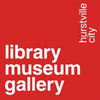
This Moving interview is part of a collaborative project between the NSW Migration Heritage Centre and Hurstville City Library, Museum & Gallery.



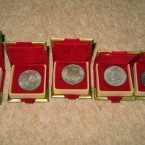
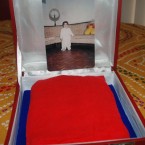
![My mother was a very busy lady. [During] school holidays we would compete crocheting with each other. She could only do one tablecloth and gave up as she didn’t have much time.](../../../cms/wp-content/uploads/2013/06/NidhiMoving10082012_MumCrotchetWhiteA_web-145x145.jpg)
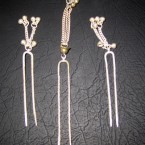
![That was a crochet bedcover my maternal grandmother was making for me [for] more than a year. She would do it at a good speed every afternoon. I remember seeing her do that. She wanted to leave behind something for us. It is very precious to me.](../../../cms/wp-content/uploads/2013/06/NidhiMoving10082012_NanaCrotchetBeigeC_web-145x145.jpg)
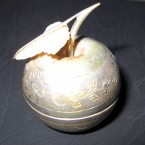
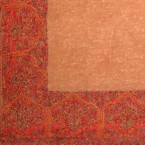
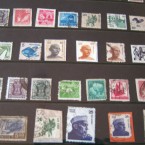
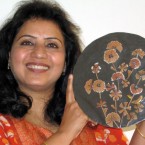
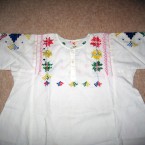
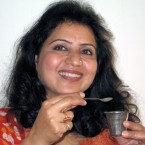
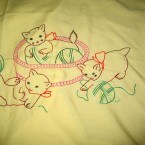
![My mother always encouraged me to keep busy. I was actively involved in National Cadet Corps. This is a prestigious trophy for the best camp commandant. They see your management skills and leadership qualities. It brings back memories of [my] very active life as a child.](../../../cms/wp-content/uploads/2013/06/NidhiMoving10082012AwardCupF_web-145x145.jpg)
![This is a [baby] bracelet somebody gifted [my son]. It is made of silver, white and black beads.](../../../cms/wp-content/uploads/2013/06/NidhiMoving10082012_SonBabyBracelet_web-145x145.jpg)